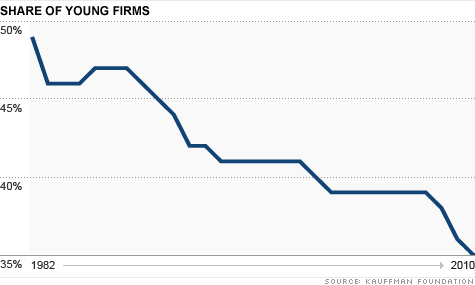Search News

In the last 30 years, the share of young firms has fallen from almost half to just over a third of all firms, according to a new study.
NEW YORK (CNNMoney) -- In the land of liberty and opportunity, startups continue to make up a smaller share of the American business landscape.
The past 30 years has seen a steady drop in the share of young firms compared to all firms, and the trend persisted in 2010, according to a report by the Kauffman Foundation based on new U.S. Census data.
Those companies that are less than five years old in 2010 made up 35% of all firms, down from 49% in 1982.
The development is "worrisome," said Javier Miranda, an economist at the Census Bureau's Center for Economic Studies, who worked on the Kauffman study.
"There are important potential implications for our ability to create jobs and increase living standards," Miranda said.
Bigger, more established corporations are less likely to take chances and adopt innovative technology or business strategies, said Miranda. That makes them more exposed to economic volatility, Miranda said.
"That means it's hard to steer them when there's a shock, when the economy's facing problems," Miranda said.
The trend also threatens to put a damper on job creation. In 2010, young firms created 31% of all U.S. jobs, according to the study, released Wednesday. That's down from 44% in 1982. On average, startups have about six employees.
The continuing trend also threatens wages, because if firms aren't getting more productive, there's less upward pressure on wages, Miranda said.
The three who worked on the Kauffman study -- Miranda, Census economist Ron S. Jarmin and University of Maryland Professor John C. Haltiwanger -- have worked together before.
They previously approached the role of new firms as job creators in 2010, when they published a report challenging the conventional wisdom that small businesses of all ages are the source of new jobs. They found it was young firms -- not all small businesses -- that fulfill this role.
But a declining share of startups could threaten that. In 1980, one in five Americans worked for a young company. It's now one in eight.
But where jobs are created they are also often times destroyed. For years, federal data have shown the number of new firms each year is nearly equal to those that fold.
Miranda said one explanation for a reduced percentage of startups could be that the businesses that weren't created are ones that would have been destined for failure anyway. If that's true, those that close shop are not the productivity enhancers we should worry about losing.
"We don't really know whether the firms that are failing to come in are ones that wouldn't have been very good anyway," he said. ![]()